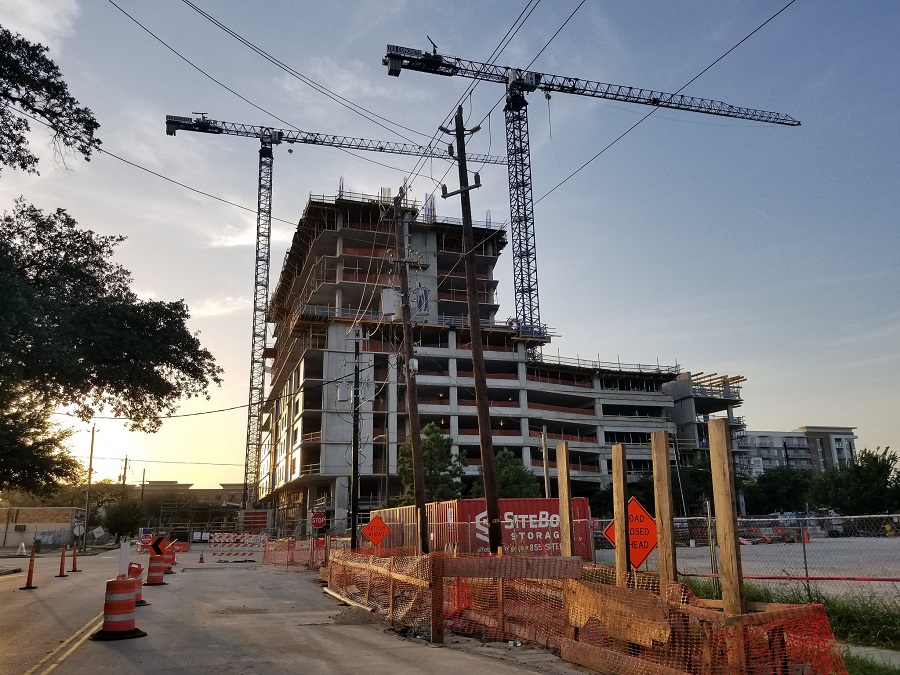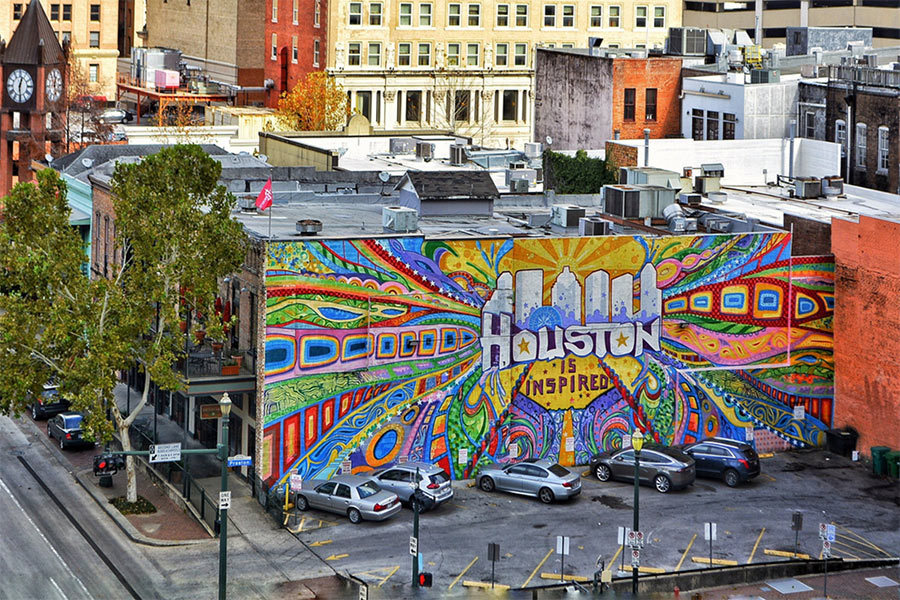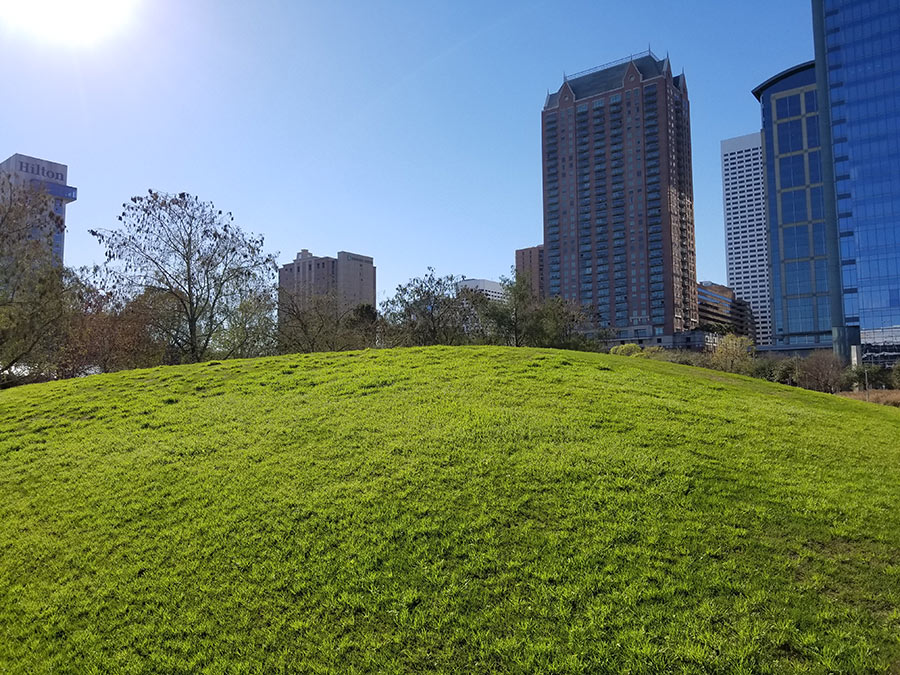
- Duke Realty Developing 5-Building Industrial Property on Former Chevron Tract in Katy [HBJ ($)]
- Howard Hughes Corp. Acquires 2 Vacant Office Buildings Adjacent to Hughes Landing [Bisnow]
- Renovation Planned for One and Three Riverway Office Buildings in the Galleria Area [Houston Chronicle]
- West Houston Home Listed for $1 Eventually Sells for $270,000 [Houston Chronicle]
- Mosaic-Filled Home Hits the Market in Timbergate [abc13]
- An Analysis into Why Houston’s Roads, Drivers Are Nation’s Most Deadly [Houston Chronicle ($)]
Photo of Caydon tower under construction between Main and Fannin streets in Midtown: Marc Longoria via Swamplot Flickr Pool
Headlines





Re: traffic fatalities. I can go 2 weeks without seeing an HPD car on city streets. I can go 2 months without seeing any law enforcement vehicle on the freeway. Violent crime is dropping in Houston (as it is nationwide). I’m OK with fewer street cops, but we need more traffic cops. https://www.usatoday.com/story/news/2018/02/19/homicides-toll-big-u-s-cities-2017/302763002/
From the article: “Houston police officers ticketed 41 percent fewer drivers in 2017 than they did in 2012, even as the number of vehicle miles traveled in Houston grew 23 percent. … Houston’s police department remains at approximately 5,200 officers, near its lowest levels in 20 years. Staffing records show approximately 150 officers assigned to its Traffic Enforcement Division — 10 fewer than were assigned to the division in 2009.”
The article keeps hammering home the message that speeding enforcement is what’s needed. But that isn’t even backed up well by the piece itself. Looking at the chart provided, it looks like DUI/DWI incidents are a bigger relative problem.
The causality of speeding is also fraught. When an accident is attributed to “excessive speed”, that’s because a responding officer checked a box on the accident report. Some officers might do it routinely regardless of the evidence at the scene, others may only do it if a witness specifically identified a speeding vehicle. Without a consistent policy, you can’t really tell whether Houston really has worse speeders than Dallas (for example). Without vehicle “black boxes”, attributing an accident to speed is at best a guess.
@etherist …. either you don’t get out much, you live in the boonies or (if you have them) need a new vision prescription …. I see them daily.
@Heightsresident, re vehicle black boxes, they’re there already:
https://www.usatoday.com/story/tech/columnist/komando/2014/12/26/keep-your-car-black-box-private/20609035/
We don’t need more cops on the road. It’s an overpriced and extremely dangerous way to do traffic management. Instead of asking cops to risk their lives, act as additional roadway hazards and create further incidents by creating traffic choke points we could install cameras to do it all. They could be modern, they could be decades old, but technology is invented for a reason.
.
I see the sheriff’s deputies on a daily basis on the I10 managed lanes and on the BW8. Of course knowing that you can speed on I10 with little worry since they’re monitoring the toll lanes. But the managed lane exits/entrances are far more dangerous than speeding itself…so that’s another issue.
Also, understood this article was on fatalities specifically which probably is more related to speeding, but living in the city my biggest fears are the freeway/tollway intersections and are directly related to under-funding or bad design…NOT speeding.
.
Whomever is running HCTRA should have the pants sued off of them for intentionally jeopardizing the lives of Houstonians and ruining freeway traffic flow by pocketing Houstons toll money for toll projects elsewhere.
Etherist, I’m not sure where you’re driving but I see one every day.
I’m with city cynic. I see multiple cops on the street writing speeding tickets every single day. Cops know all the spots where the posted limit doesn’t match the street conditions. Those are their honey holes. They are constantly manned by HPD or HCSD.
Maybe people are “speeding” because the posted speed limits don’t match the reality of the road conditions that people are driving on. Mayor Parker made a big effort to lower speed limits to 30 mph unless other wise defined. That created additional revenue for the cash strapped city from tickets.
joel:
It can be hard to enforce camera tickets. ID problems.
I like how the Chronicle tried to find some angle to blame the Grand Parkway for being engineered for high posted speed limits…and then how the data and many anecdotes point to roadways that are neither engineered for high speeds or that have high speed limits posted, but upon which it is perfectly common knowledge that one will observe ridiculously dangerous driving behavior on any given night (e.g. I-45, I-69, Westheimer, Richmond) or the sort of random suburban secondary thoroughfares where nobody ever reasonably expects to get caught.
.
Yes, traffic policing affects peoples’ willingness to drive like dumbasses. No doubt about it. I know that I am careful to obey all laws on the evening of a major holiday because that’s when I am most likely to get caught. I won’t even bother trying to drive fast strategically and I won’t drive if I’ve had even a little bit to drink; I’m just going to comply, period. I can’t be bothered with that crap.
.
A big problem is that a 60mph limit on most freeways is linked to the Houston region being an EPA-designated environmental non-attainment area and isn’t linked in any way to public safety but rather to obscure federal meddling and funding schemes. Ordinary drivers that are reasonably safe know intuitively that this speed limit is not suitably high, they know that few people abide by it, they know that enforcement is usually lax, and they are effectively acculturated to driving in a city that might as well not have any posted speed limits. Then, if and when ordinary people actually do get pulled over for driving a reasonable speed that is above the statutory limit, they are understandably pissed off whether whether or not they were driving reasonably because the law and the enforcement of the law isn’t just or equitable.
.
Local and state government knows that these limits are artificial, the result of federal meddling rather than a safety concern, and also that ordinary reasonable and otherwise-law-abiding people that are outspoken and that have access to legal defense would give them absolute hell if they tried to enforce posted speed limits uniformly.
.
Law enforcement does need a visible presence on highways, but police also need to be allowed the discretion to ignore minor infractions (or perhaps a set of laws that identifies fewer infractions) and a system to warn them of people that really are being dumbasses. The legislature should understandably be concerned with automated cameras being misused by law enforcement entities, but if those cameras were provisionally allowed to identify truly reckless speeding (say, >3 Std. Dev. on a given roadway in terms of speed or lateral movement within a lane) to enable police officers to target those vehicles and to apprehend and correctly identify drivers, that would be acceptable. Nobody that drives anywhere at or around the speed of traffic, regardless of posted limits, should have to worry about being hassled.
.
Yes, that does mean that there is a trade-off. If we made speed limits 20mph on all of our streets, thoroughfares, and freeways — and enforced it — that would undoubtedly save lives. The formula for kinetic energy is mass times velocity *squared* divided by two. Velocity is *squared*! It is absolutely frickin’ dangerous! And yet we are not ever going to do that. Safety is not and should not be the paramount goal of governance. We shouldn’t pretend that it is, yes even when children die. Shit happens, but quality of life is important too. Obviously. Go ahead, accuse me of being a calloused and heartless bastard. It doesn’t matter. This is our reality: speed gets us where we’re going. Scarce police resources are another reality. Abuses of police power are a reality. We need policies that will help us to target police and prosecutorial resources so that they can nab the dangerous people who really are outliers, who are the same people that new laws or blanket enforcement would be unlikely to influence. Truly dangerous people are unreasonable as a matter of course. They are the problem.
.
The rest of us should be left alone to more or less figure out what is reasonable.